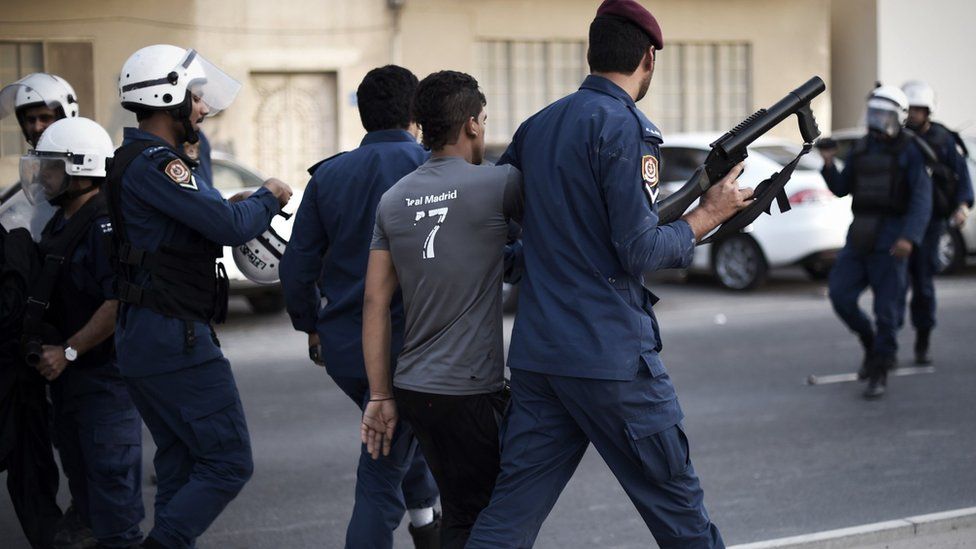Bahrain security forces 'continue to torture detainees'
- Published

Bahrain's security forces are torturing detainees during interrogation, despite a pledge by the king to end such practices, Human Rights Watch says.
A new report found abuses in custody documented by an independent committee after the crackdown on pro-democracy protests in 2011 had continued.
It concluded that the authorities had failed to tackle what the committee described as a "culture of impunity".
The government said the allegations were "incorrect and unfounded".
Bahrain continues to be wracked by political unrest, with the kingdom's Shia majority demanding greater political rights from the Sunni-led government, and violent attacks blamed on militants linked to Iran.
'Electrical shocks'
The violent suppression of the uprising four years ago, in which dozens were killed, hundreds injured and many more arrested, triggered an international outcry.
King Hamad bin Isa Al Khalifa responded by establishing the Bahrain International Commission of Inquiry (BICI), a panel of human rights experts, to investigate alleged abuses.
The BICI concluded in its report of 23 November 2011, that the National Security Agency and the interior ministry had "followed a systematic practice of physical and psychological mistreatment, which in many cases amounted to torture, with respect to a large number of detainees in their custody".
King Hamad accepted the report in full and three government bodies were set up with a collective mandate to end torture in interrogation and detention facilities.
However, HRW's report concluded that the anti-torture bodies lacked independence and transparency and had failed to fulfil their mandate.
Since 2012, there had been only one prosecution for torture and none relating to detentions associated with the political unrest, despite hundreds of complaints, it noted.
The US-based group interviewed 10 detainees who said they had endured coercive interrogations at the interior ministry's Criminal Investigations Directorate (CID) and in police stations since 2012, and four former inmates of Jaw prison, who said authorities had tortured them in March 2015.
Several described being subjected to electric shocks; suspension in painful positions, including by their wrists while handcuffed; forced standing; extreme cold; and sexual abuse.
Hussein Jawad, a human rights advocate who was arrested in February, said officers had squeezed his genitals, beaten him in a hallway, and "threatened to rape his wife".
"The claims of Bahrain and its allies that authorities have ended torture in detention are simply not credible," said Joe Stork, HRW's deputy Middle East director.
"All the available evidence supports the conclusion that these new institutions have not effectively tackled what the BICI report described as a 'culture of impunity' among security forces."
The inspector-general of Bahrain's interior ministry, Maj Gen Ibrahim al-Ghaith, insisted in a letter to HRW that it had carried out all of the BICI's recommendations.
"Your conclusion that 'the authorities have failed to tackle a culture of impunity among the security forces' is incorrect and unfounded," he added.
A separate government statement sent to the Associated Press said 73 security forces personnel had been "transferred to courts on charges of mistreatment".
- Published28 May 2015
- Published31 October 2015
- Published30 September 2015
- Published16 June 2015